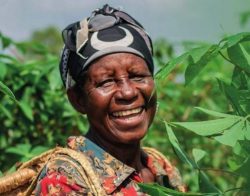
The commissioning by President William Ruto of over 7,000 extension officers to help farmers boost food security tops key initiatives announced during the 61st Madaraka Day celebrations to transform Kenya’s agricultural sector. The 7,000 agribusiness experts will encourage farmers to adopt improved methods of farming. President Ruto, who led the festivities themed “Agriculture and Food Security,” at Masinde Muliro Stadium in Bungoma County, said the experts would work with farmers to boost production across the country. They will also be supported with the necessary digital tools for efficiency and are now the frontline of government efforts to mobilize farmers. They will serve in all 47 counties in three categories: general practitioners, animal health and genetics, and fodder.
The Officers will help farmers access financial services, make loan applications, and connecting them to providers of farm and mechanization services. They will link farmers to markets, offer financial literacy and advise them on climate smart practices and mechanization. President Ruto noted that his government is keen on boosting agricultural production and food security.
“Agriculture is the backbone of the country’s economy, directly contributing 25 per cent to the gross domestic product and supports other economic pillars such as manufacturing. It boosts the GDP by a further 27 per cent as it employs 40 per cent of the population,” said the President.
During the event, he announced that the government will write off several debts, provide input subsidies, increase the use of irrigation, and enhance climate mitigation efforts. “The government will write off Sh110 billion accumulated debts for sugar factories in the last 40 years. There will also be a new leasing model that will guarantee prompt payment for cane deliveries by farmers, timely wages for factory workers and bonuses to sugar cane farmers every end of the year, like other crops,” President Ruto said.
Writing off the debt is expected to boost the sugar sector, especially in Western Kenya, which has been saddled with mounting debt. The President further announced that the government would invest Sh2 billion into sugarcane development through state-owned mills. “I am proud to announce that the government has approved the first tranche of Sh600 million for seed cane development, and the National Treasury shall shortly release these funds,” he said.
The government also wrote off Sh6.9 billion debt owed by coffee cooperatives, assuring farmers of good returns this year. “Measures are underway to boost coffee productivity from 2kg to 10kg per tree and from 50,000 metric tonnes to 102,000 metric tonnes a year by 2027. Under the coffee sector reforms that we initiated, a Sh4 billion coffee cherry fund was established, Sh2 billions of which has been paid, with the balance allocated for payment in the 2024/2025 financial year,” he said.

The government’s efforts to revive the coffee sector are paying off, with the area under coffee growing to 111,900 hectares in 2023, according to the Kenya National Bureau of Statistics. Total production rose from 34,500 tonnes in 2021 to 48,700 tonnes in 2023. Yields increased from 2,527.5 kg/ha to 2,827.6 kg/ha during the same period.
President Ruto lauded the crucial role small-scale farmers play in food production, describing them as the backbone of Kenya’s agriculture. He said the government has entered strategic partnerships with various value chain actors, including input suppliers, producers, and processors, to support farmers and ensure food security. These partnerships are in key value chains such as maize, livestock, tea, coffee, edible oils, cashew nuts, pyrethrum, flowers, avocado, and macadamia nuts. To promote edible oil production, he said the government distributed 70 tonnes of sunflower seeds, with more allocations scheduled for the next financial year.
This is part of the National Edible Oils Promotion Project, which aims to strengthen the edible oils value chain. The President outlined ambitious plans to expand cotton farming, targeting an increase in production from 2,500 bales in 2022 to 107,000 bales by 2025. He said modernizing ginneries and providing subsidized fertilizer and improved seeds are broader components of the strategy aimed at supporting farmers and boosting productivity in the cotton industry.

Acknowledging the impact of climate change on agriculture, President Ruto reaffirmed the government’s commitment to climate mitigation through afforestation, landscape restoration, and the promotion of climate smart technologies. Significant investments are also being made in the livestock sector to improve productivity and disease control, including the production of 35 million doses of assorted vaccines by the Kenya Veterinary Vaccines Production Institute. To boost exports, he said the government had secured quota-free and duty-free access to international markets, including a new Economic Partnership Agreement with the 27-member European Union.
“I also wish to report that during my recent visit to the US, we negotiated the renewal of the African Growth and Opportunity Act, an instrument which has enhanced access to the US market for African exports, and catalyzed the rapid growth of Kenyan exports, especially in the textile and apparel industry,” he said.
During the event, President Ruto also reflected on the long journey Kenya has travelled since gaining self-governance, highlighting the country’s evolution into a strong, united state with a diverse economy.
